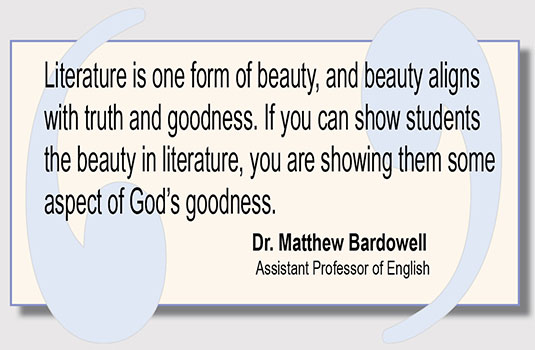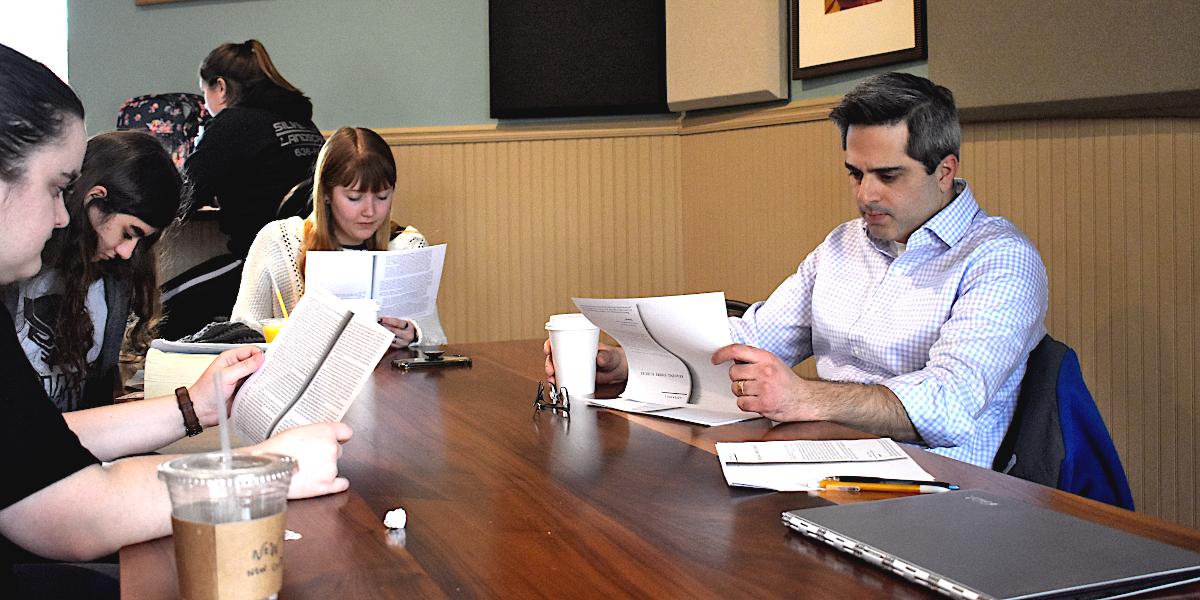Many people have a defining moment that changes their life forever, and for MBU professor Dr. Matthew Bardowell, this was when he saw, “The Fellowship of the Ring,” in 2001. The film inspired Bardowell and instilled in him a passion for literature, something he wishes to share and ignite in MBU students.
Dr. Matthew Bardowell discusses the structure of a short story with English students at a monthly Creative Writing Club meeting. Bardowell instructs many of the upper-level English and British literature courses.
__________________________________________________
Individuals often have defining moments in life, and for professor Matthew Bardowell, it came from watching, and then later reading, J.R.R. Tolkien’s renowned novel.
“I can remember sitting in the theater and feeling that I was entering a story that had a deep power to it. After that, I knew I wanted to think about and write about literature for the rest of my life,” he said. “Until then, I sort of thought I’d be a lawyer or something.”
That was at the end of 2001, and the classic movie and novel spurred Bardowell toward a career in literature.
Bardowell, who has been on faculty in the English Department at Missouri Baptist University since 2016 after finishing his doctorate the same year, grew up in South Florida, after his parents, who have a Lebanese heritage, immigrated from Jamaica to the United States in the 1970s.
“I feel that a lot of my upbringing is as the son of immigrants to the United States,” he said. “Learning what American culture was like was interesting.”
For instance, in dealing with negative interactions at school, he found a discrepancy between his parents’ suggested solution and his perception of how it would succeed in the American culture.
“Not that it was hugely different, but there would be some moments where if I got bullied or something at school, my parents would be like, ‘Here’s what you tell the bullies,’ and they’d give me this really lame thing to say. I’m like, ‘That doesn’t make any sense. I don’t think that’s going to work.’”
Although Bardowell grew up in American culture, he still takes notice of his Jamaican heritage and the influences it has on him, specifically in the way he speaks.
“There are certain words I still have a hard time saying because [my parents] still speak with a Jamaican accent,” he said. “‘Hear’ is one. I always get ‘hear’ like hearing with your ears and ‘hair’ on your head mixed up.”
Bardowell also had to break from the timid personality he displayed as a kid, and he credits his father, who had an outgoing demeanor, as playing a role in the process.
“What are you afraid of?” he said, echoing his father’s encouragement. “If you try for something the worst thing that can happen isn’t that bad.”
Bardowell’s office in the Field Academic Building contains a neatly organized bookshelf, a wall of family pictures, a microwave, a chair for guests and a computer supported by a copy of Edmund Spenser’s, “The Faerie Queene,” a medieval epic.
However, he did not initially pursue a career in literature, and, instead, as a result of growing up in a religious home, he planned to enter the field of ministry.
“I always thought I’d go into ministry,” he said, but an interning experience at a campus ministry where outcomes were prioritized over people changed his perspective.
“I felt a little bit like a sleazy used car salesman. We tended to feel a lot of pressure to produce results, and this was pretty soul crushing,” he recalled about the experience.
After changing his career goals, Bardowell pursued an English degree with the idea of becoming a lawyer. However, Frodo and company stirred a growing passion that altered the course of his life and his future studies.
“I set out to read everything that Tolkien had written and everything he read to make him who he was, and that’s why I concentrated on medieval literature in my doctoral program,” he said.
The beginning tale of, “The Lord of the Rings,” prompted Bardowell to follow his interest in literature, which guided him to a master’s program at Florida Atlantic University where his professor, Thomas Martin, further influenced him.
“He awakened me to the idea that, when we write, we’re writing into a conversation that has been going on long before we enter in and that will continue long after we say our piece,” Bardowell said. “This was the first time I viewed my writing as something I was contributing to a body of knowledge on a particular topic, and it changed the way I thought about academic writing permanently after that.”
After earning his Master of Arts in English, Bardowell went on to earn his doctorate in English from Saint Louis University, where he completed his dissertation on Old English and Old Norse poetry because of his fascination with Tolkien.
However, he also cites the project as one of the most challenging academic endeavors he has accomplished.
 “What if I die before I finished this?” he said, referring to the dreary yet rewarding process.
“What if I die before I finished this?” he said, referring to the dreary yet rewarding process.
Immediately after finishing his doctoral program at SLU, Bardowell was hired as an assistant professor of English at Missouri Baptist University, where he has continued to grow his appreciation for literature, sharing it with students along the way.
“Literature is one form of beauty, and beauty aligns with truth and goodness,” he said. “If you can show students the beauty in literature, you are showing them some aspect of God’s goodness.”
Indeed, Bardowell’s passion and affinity for art have an infectious quality that rubs off on his students, who appreciate his knowledge and willingness to help them understand the text as well as learn life lessons.
“He’s a really good professor, and he’s super knowledgeable about everything that he teaches,” said Jonathan Cox, a senior English major from Herculaneum, Missouri. “His discussions are always great because he’s super knowledgeable. If he says something he’ll always have something like, ‘Oh, you should read this article or read this.’”
While helping and encouraging students, Bardowell’s comprehension and influence have also garnered the respect of his fellow professors.
“He’s an exemplary English professor,” said Dr. John Han, who hired Bardowell and serves as chair of the Humanities Division at MBU. “His scholarship, teaching, demeanor, collegiality and overall attitude are very likeable. He’s a very competent and likeable person.”
Outside of literature, Bardowell enjoys spending time with his kids, whether playing baseball with David, 8, getting sent to the make believe principal’s office by Evelyn, 6, or taking care of Samuel, 3.
He also relishes taking care of the house, cutting the grass, occasionally listening to Coldplay, cooking and spending time with his wife, Rachel, who is a physician and assistant professor of medicine at Washington University in St. Louis.
Bardowell is also a die-hard Miami Dolphins fan, a side-effect of growing up in South Florida.
“Obviously I’m joking here, but being a Dolphins fan means that you learn to be loyal to an organization that really doesn’t care about you and probably won’t make very good decisions to improve over time,” he said. “I’ve passed this love on to my son, which is sad for him.”
Of course, he also finds time to read, with some of his favorite works coming from Tolkien, although he has read almost all of Stephen King’s major works as well.
He contributes his fascination with King, who is known for his horror novels, to the author’s understanding of beauty and goodness.
“One of the reasons I find [King] to be so powerful is that he seems to have a firm grasp on goodness as well,” he said, specifically mentioning the moment in “Hearts of Atlantis” when Bobby Garfield receives a letter assuring him that his lost friend is safe.
Because of the goodness and beauty in literature, Bardowell enjoys teaching the introductory World Literary Types class, which provides him an opportunity to reveal these features to students who may not take upper-level English courses.
“It’s a chance to show [students] the power of literature to describe the human condition, to show us what we long for and how we sometimes seek to fulfill that longing in all the wrong places,” he said, acknowledging the ability for stories to make an impact outside of the classroom. “You can see that a text that once was hollow for some students starts to mean something important to them. I love those moments.”
